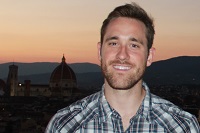 Aaron is an Experienced Researcher at the Istituto di Fisica Applicata “Nello Carrara” (IFAC) del Consiglio Nazionale delle Ricerche in Florence, Italy. He earned his B.S. in Mathematics and B.S. in Mechanical Engineering from the University of Missouri. Aaron was awarded his M.S. and Ph.D. in Aerospace Engineering Sciences from the University of Colorado at Boulder, working with Prof. Dan Scheeres as a member of the Colorado Center for Astrodynamics Research. His research focused on the dynamical behavior of highly perturbed natural and artificial celestial bodies, and was supported by the National Science Foundation and the Air Force Office of Scientific Research. Aaron’s research interests include space situational awareness, orbital debris, planetary science, celestial mechanics, and dynamical astronomy. Outside of research, he enjoys running, boxing, traveling, and exploring nature.
Aaron is an Experienced Researcher at the Istituto di Fisica Applicata “Nello Carrara” (IFAC) del Consiglio Nazionale delle Ricerche in Florence, Italy. He earned his B.S. in Mathematics and B.S. in Mechanical Engineering from the University of Missouri. Aaron was awarded his M.S. and Ph.D. in Aerospace Engineering Sciences from the University of Colorado at Boulder, working with Prof. Dan Scheeres as a member of the Colorado Center for Astrodynamics Research. His research focused on the dynamical behavior of highly perturbed natural and artificial celestial bodies, and was supported by the National Science Foundation and the Air Force Office of Scientific Research. Aaron’s research interests include space situational awareness, orbital debris, planetary science, celestial mechanics, and dynamical astronomy. Outside of research, he enjoys running, boxing, traveling, and exploring nature.
Project description:
The importance of managing space debris is acknowledged by all space-faring nations, as the long-term financial, legal, and environmental implications of collisions between high-value satellites are manifest. As we begin to discover the full scope of the debris problem, we are finding that the current, internationally established, disposal schemes and mitigation practices are now obsolescent. A better understanding of the nature, evolution, and origin of debris in different orbital regimes is critical for space situational awareness. The detailed motions of these bodies are more complicated than the simple picture portrayed by Kepler: gravitational and non-gravitational perturbations affect both their orbital and attitude motions, leading to complex evolutionary behavior and possibly generating orbital chaos. This project explores the dynamics and collision risk, both analytically and numerically, of debris in Earth orbit, and studies various active debris removal scenarios. The techniques and formalisms developed will also be applied towards a better understanding of the near-Earth asteroid problem.
Supervisor: Dr. Alessandro Rossi
Aaron's Work